|
|
|
Sort Order |
|
|
|
Items / Page
|
|
|
|
|
|
|
| Srl | Item |
| 1 |
ID:
145637
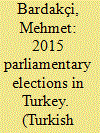

|
|
|
|
|
| Summary/Abstract |
Turkey held two consecutive parliamentary elections in an interval of five months that produced entirely different results. The June 7 elections saw the Adalet ve Kalkınma Partisi (AKP) lose its parliamentary majority and the rise of the Halkların Demokratik Partisi (HDP) as a game-changer. Following the collapse of coalition talks, the subsequent snap elections held on November 1, 2015 took place under a dramatically different context, being marked with issues of security and stability that trumped the issues that were decisive in the June 7 elections, such as the economic slowdown, growing authoritarianism, and allegations of corruption. The electorate's search for a stable and strong government, the AKP's adjustments in an apparent response to the criticisms of the electorate, and the mistakes made by opposition parties gave the AKP the opportunity once again to form a single-party government after the November 1 elections.
|
|
|
|
|
|
|
|
|
|
|
|
|
|
|
|
| 2 |
ID:
129558
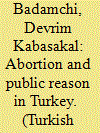

|
|
|
|
|
| Publication |
2014.
|
| Summary/Abstract |
During May and June 2012, the question of abortion was hotly debated in Turkish public forums. This paper analyzes the main characteristics of this abortion debate using John Rawls's conception of public reason as a normative framework. In doing so, speeches and declarations on abortion made by legislators are critically evaluated. The arguments in the debate are examined with a view to interpret how the issue should be discussed as far as the demands of public reason are concerned. From a Rawlsian framework, it is observed that the pro-ban position (Adalet ve Kalk?nma Partisi) is far from contributing to a reasonable balance of political values on abortion whereas the contra-ban position (Cumhuriyet Halk Partisi) satisfies the demands of public reason. Moreover, it is argued that, the latest proposed legislation on abortion cannot be viewed as an outcome of a reasonable balance of political values but is rather an outcome of pragmatic compromise.
|
|
|
|
|
|
|
|
|
|
|
|
|
|
|
|
| 3 |
ID:
178608


|
|
|
|
|
| Summary/Abstract |
The coup attempt of 2016 constitutes a major incision in contemporary Turkish politics. Focusing on the symbolic aspects of the AKP’s authoritarian rule in the direct aftermath of the coup attempt, this article offers a new conceptual framework to analyze three symbolic and discursive strategies that the government employed with the aim to normalize its exceptional and transformative measures: legitimation, narrativization and ritualization. It argues that these strategies contribute to the deepening of the AKP’s authoritarian regime formation and contends that the government’s actions are a reflection of the power struggle between the AKP and the Gülen movement.
|
|
|
|
|
|
|
|
|
|
|
|
|
|
|
|
| 4 |
ID:
190813
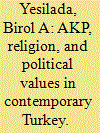

|
|
|
|
|
| Summary/Abstract |
The Justice and Development Party (AKP) came to power in 2002 with the promise of reforms to further democratic consolidation in Turkey. At that time, the AKP represented a rainbow coalition of individuals from the previous Islamist parties and many liberal democrats who were fed up with the failures of old secular political parties. The Turkish public shared their frustrations and overwhelmingly supported the AKP. Unfortunately, these reforms did not last. Today, it is indisputable that under the rule of the AKP, and more specifically, President Recep T. Erdoğan, Turkey has become an authoritarian state defined and shaped by one person. This article explores what these developments mean for the future of Turkish democracy as the country celebrates its centenary, and it includes an examination of whether Turkish political culture is supportive of such changes.
|
|
|
|
|
|
|
|
|
|
|
|
|
|
|
|
| 5 |
ID:
160662
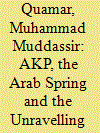

|
|
|
|
|
| Summary/Abstract |
The rise of the Adalet ve Kalkınma Partisi (AKP), its domestic and foreign policy successes and its early response to the Arab Spring made it popular in the Arab world. Many inside Turkey, the US and the Arab world saw the AKP as an Islamist party with a difference, that could be a ‘model’ for the Arab countries struggling with a democratic deficit. The violent turn taken by the uprisings in Syria, Iraq and Egypt and the internal developments in Turkey that followed afterwards, however, exposed the limitations of the ‘model.’ This essay argues that Turkey cannot be a ‘model’ as it suffers from shortcomings, but it can offer some lessons for the Arab world.
|
|
|
|
|
|
|
|
|
|
|
|
|
|
|
|
| 6 |
ID:
171944
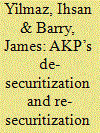

|
|
|
|
|
| Summary/Abstract |
This article evaluates the Turkish state’s relations with the Alevi community through a securitization theory framework. It first examines the issue in its historical context, comparing Kemalist and more recent policies, and highlights that despite the ideological differences between the previous governments and the current AKP government, for Alevis much has remained the same. It then turns to the securitization of the Alevis by successive regimes, and demonstrates that the period of de-securitization begun under the AKP did not end the practice, and that political expedience led to the issue’s re-securitization.
|
|
|
|
|
|
|
|
|
|
|
|
|
|
|
|
| 7 |
ID:
162008
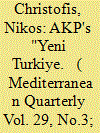

|
|
|
|
|
| Summary/Abstract |
The essay shows how Turkey's Justice and Development Party (AKP) and, most importantly, the country's president, Recep Tayyip Erdogan, use the concept of Yeni Turkiye (New Turkey) in attempts to construct a new national state tradition, a counterhegemonic narrative to replace Turkey's traditional one, Kemalism. It is argued that the AKP aims to replace Kemalism to reconstruct the imagined Turkish community anew. It is further argued that collective memory is central to AKP discourses and repertoires in the party's attempt to construct stabilized, sedimented, dominant, and durable features in this renewed process of Turkish national-identity formation and nation building.
|
|
|
|
|
|
|
|
|
|
|
|
|
|
|
|
| 8 |
ID:
183910


|
|
|
|
|
| Summary/Abstract |
This paper charts how the Gülen movement (GM)’s allegiance and effectiveness has changed over the past two decades. It examines how the GM has moved from being a fellow Islamist actor in Turkish politics to close ally during the first ten years of the AKP government with the joint aim of decreasing the Kemalist hold on the establishment. The paper then examines how the GM has been delegitimised by the AKP since it became more of a risk than an asset amidst disagreements over policy direction. It argues that the GM has transitioned from being a rival to an ally of the AKP in order to facilitate policy; going from a non-state actor pre-2002 to a quasi-state actor during its alliance. The alliance was a mutually beneficial ‘marriage of convenience’ which enabled both parties to consolidate power often through illiberal means. However, since 2013 the AKP-Gülen relationship has deteriorated markedly and the movement is now an enemy of the AKP and a victim of the same authoritarian drift it was previously complicit in.
|
|
|
|
|
|
|
|
|
|
|
|
|
|
|
|
| 9 |
ID:
105388
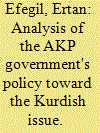

|
|
|
|
|
| Publication |
2011.
|
| Summary/Abstract |
The Kurdish issue emerged as a result of the Kemalist modernization policy. For many years Kurds and other groups were forced to absorb Turkish values and culture instead of developing their own local identities. For this reason, Kurdish uprisings occurred. By describing these uprisings as ethnic separatist movements, the government authorities instituted military measures against Kurdish groups in order to suppress their demands. But, for the first time in 1992 former President Turgut Özal accepted the reality of the Kurdish issue rather than describing it as an ethnic separatist movement. Accordingly, he suggested taking social, political and cultural measures as supplements to military operations. Özal's approach has been seriously taken up by the AKP government. As opposed to traditional policy, the existing government has noted that the problem emerged from violation of democratic rights of Kurdish people by state authorities and advocated that serious measures be taken to improve the socio-economic conditions in Southeastern Anatolia. The AKP government took considerable steps to improve democratic conditions in Turkey despite the PKK attack on the Dag(l?ca gendarme station on October 21, 2007. Permission to freely use the Kurdish language and changing the names of some towns back to original Kurdish were some of the results. But the military elites, the opposition parties - the CHP and the MHP - and the Kurdish-originated PDP party opposed the government's policy. Still, in order to find a peaceful solution to the question, the government has to make fundamental constitutional amendments in order to improve conditions and guarantee the rights of Kurdish people. In the meantime, it has to take serious steps to improve socio-economic conditions in the region as well as disarm the PKK terrorists.
|
|
|
|
|
|
|
|
|
|
|
|
|
|
|
|
| 10 |
ID:
188970
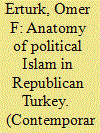

|
|
|
|
|
| Summary/Abstract |
The Milli Görüş political Islamic movement and the first political parties under its banner were founded and dominated by the Naqshbandis. Numerous scholars have so far suggested that political participation has led these groups to transform and moderate their former Islamist views over time. This study examines this possibility by scrutinising how Naqshbandi and Milli Görüş leadership perceive the state, essential political institutions such as the legislature, political parties, opposition, elections, and independent media, together with some defining issues in Islam such as jihad, excommunication, and al-wala’ wa-lbara’ (loyalty and disavowal). In particular, the study seeks to uncover how the Naqshbandi theological background has been turned into a political Islamist ideology through the influence of two important Naqshbandi shaykhs, Mehmed Zahid Kotku (1952–1980) and Mahmud Es’ad Coşan (1980–2001), and two leading Naqshbandi-affiliated Milli Görüş leaders Necmettin Erbakan and R. Tayyip Erdoğan to reveal if/to what extent Islamists’ participation in politics has transformed their Islamist views. As a methodology, content analysis and political discourse analysis have been used. The findings demonstrate a continuity of Islamist Naqshbandi thought in Milli Görüş leadership and that political participation has neither ‘democratised’ nor ‘moderated’ these parties and their radical Islamist thoughts.
|
|
|
|
|
|
|
|
|
|
|
|
|
|
|
|
| 11 |
ID:
168495


|
|
|
|
|
| Summary/Abstract |
This article examines Turkey’s authoritarian state surveillance regime by developing the concept of the authoritarian surveillant assemblage (ASA), building on and expanding the concept of the surveillant assemblage (SA). Turkey’s ASA is the outcome of diverse surveillance systems, which continuously expand their reach, form new connections and incorporate new actors. These systems include a protest and dissent surveillance system, an internet surveillance system, a synoptic media surveillance system and an informant–collaborator surveillance system. Turkey’s ASA is controlled by the Turkish state and serves its repressive interests. Although pivotal in emphasizing the complexity of surveillance connections and increasing diversification of and collaboration among surveillance actors, the SA model of surveillance puts the main emphasis on decentralized, uncoordinated and multifaceted forms of surveillance, and does not offer sufficient analytical space to understand how an authoritarian state could coordinate diverse surveillance systems and use it for the overarching purpose of control. The article draws on Michael Mann’s theory of state power and the authoritarian state to address these limitations of the SA and conceptualize the ASA. It shows how the diverse systems of Turkey’s ASA work in concert with one another under the hierarchical command of Erdoğan’s Justice and Development Party (AKP) to control the population and suppress dissent.
|
|
|
|
|
|
|
|
|
|
|
|
|
|
|
|
| 12 |
ID:
184173
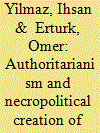

|
|
|
|
|
| Summary/Abstract |
One of the most widely used and influential ways of creating foundational myths for authoritarian legitimation is to construct a necropolitical narrative around the significance of dying for the nation, homeland, state and the leader, i.e. martyrdom. Mbembe’s concept ‘necropolitics’ (the right of the sovereign to determine who shall live and who shall die) has been expanded to include the pollical instrumentalization of martyrdom narratives. However, the literature has not analyzed the necropolitical martyr-icons. This paper aims to address this gap by looking at two historical episodes in Turkey, one in the 1930s dominated by secularists and post-2016 dominated by Islamists.
|
|
|
|
|
|
|
|
|
|
|
|
|
|
|
|
| 13 |
ID:
183249
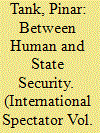

|
|
|
|
|
| Summary/Abstract |
Since 2011, Turkey’s ruling Justice and Development Party (AKP) government has sought to portray the country as an emerging humanitarian and peacebuilding power, mobilising the country’s diplomatic and foreign policy resources to project the AKP’s vision of Turkey’s Islamic identity through the lens of its duty to help. An analysis of the official narratives on the state’s humanitarian and peacebuilding policies as they have evolved in the Syrian conflict highlights the tensions between a human security approach aimed at projecting Turkey as a normative humanitarian power and a state security approach based on the AKP government’s perceived national security needs.
|
|
|
|
|
|
|
|
|
|
|
|
|
|
|
|
| 14 |
ID:
181649
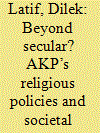

|
|
|
|
|
| Summary/Abstract |
This article addresses the religious policies of Turkey’s Justice and Development Party (AKP) targeted at promoting Islam among the Turkish Cypriot community. For the secular circles of the Turkish Cypriot community, the AKP’s imposed religious policies constitute a threat to its fundamental features and social fabric. Islamisation policies are regarded as cultural imperialism of the AKP government, with the aim of generating a religious youth, a conservative mentality, and more widespread religious practice in North Cyprus. Within this context, this article analyzes the historical account of the secularization experience of the Turkish Cypriot community, the politicization of religion with reference to education, and the penetration of AKP’s religious policies in North Cyprus.
|
|
|
|
|
|
|
|
|
|
|
|
|
|
|
|
| 15 |
ID:
184349
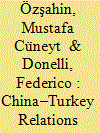

|
|
|
|
|
| Summary/Abstract |
There is plenty of studies focusing on China’s global outreach through its Belt and Road Initiative (BRI). In tandem with this, the extensive literature on China depicts it as the next hegemon to succeed in the USA. Along this line, flourishing ties with various Asian nations, including the Middle Eastern countries, as a result of China’s recent foreign policy activism has been addressed extensively. While most research has been stressing the rising assertiveness of China in world politics, only a limited number of studies have touched upon the responses from middle or small powers against China’s ascent. Drawing from neoclassical realism, this article contends two levels of analysis for delineating the interaction between Turkey, a middle power, and China, a rising great power. First, the exchange between Turkey and the USA is vital in determining the cordial relations between Turkey and China. Alteration in the American policy vis-à-vis Turkey in the wake of the Arab Spring is relevant to Turkey’s growing relations with China. Second, is the rising anti-Westernism of foreign policy elites as part of the alteration in the strategic culture of Turkish politics, which makes Turkey’s rapprochement with China possible. Nevertheless, it should be noted that these two levels are intertwined and feed each other. Consequently, employing a neoclassical realist approach, the article argues that the middle powers’ stance against a rising hegemon is conditional upon the bilateral relations with the current hegemon and peculiarities of domestic politics.
|
|
|
|
|
|
|
|
|
|
|
|
|
|
|
|
| 16 |
ID:
184072
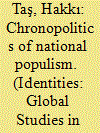

|
|
|
|
|
| Summary/Abstract |
Inspired by the populists’ salient urge to recalibrate and locate contingent developments within a larger temporal order and establish historical continuity, this paper dwells on the chronopolitics of national populism and calls for a systematic treatment of time in these movements. Focusing on the neglected narrative dimension, such an inquiry will afford an alternative reading from which to engage with and critique the magnitude of populism. This study argues that despite ample variance and claims of uniqueness, national populisms employ a shared temporal template that accounts for a particular national subjectivity through a set of timing and sequencing of events complemented by affective stimuli. It focuses on the case of Turkey. More pronounced since 2013 Gezi Protests, the rising tide of national populism under President Tayyip Erdoğan’s rule encapsulates how these populisms conflate the past, present, and future into a single narrative about the people’s survival and prosperity.
|
|
|
|
|
|
|
|
|
|
|
|
|
|
|
|
| 17 |
ID:
173144
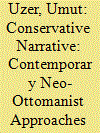

|
|
|
|
|
| Summary/Abstract |
Turkish politicians, intellectuals and ordinary citizens usually take an ambivalent view of the Ottoman state. The founding fathers of Turkey, mostly soldiers and bureaucrats in the Ottoman state structure had, for the most part, negative perceptions owing to the loss of territory and defeats during the latter days of the Ottoman Empire. Consequently, republican Turkey endeavored to create a modern Turkish nation that was very much part of Western civilization. Nevertheless, fascination with the Ottoman Empire rose to the fore during the multiparty era of the 1950s and further increased in the 1980s and now under the Justice and Development Party (AKP) government. The AKP leadership has been articulating a new identity and historical perspective to create a new national identity for Turkey. This article analyzes the nostalgia for the Ottoman Empire in Turkish politics by focusing on the conservative ideologue Necip Fazıl Kısakürek (1904–1983), who had a significant impact on the AKP leadership as well as on efforts to create a new post-Kemalist Turkey.
|
|
|
|
|
|
|
|
|
|
|
|
|
|
|
|
| 18 |
ID:
181644
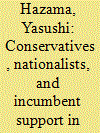

|
|
|
|
|
| Summary/Abstract |
To consolidate a predominant party system, an incumbent party will attempt to anchor voting behavior to social cleavages, a strategy called cleavage enclosure. However, does this strategy actually work? In Turkey, the incumbent AKP government has focused its campaigning on conservatives and nationalists. The analysis of the 2018 post-election survey reveals that the cleavage enclosure worked for conservatives but not for nationalists. Of the incumbent supporters in the previous election, conservatives replicated their support, whereas nationalists were less likely to support the incumbent than other identity holders. Nationalists tend to punish but not reward the incumbent party for its economic performance.
|
|
|
|
|
|
|
|
|
|
|
|
|
|
|
|
| 19 |
ID:
129560
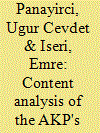

|
|
|
|
|
| Publication |
2014.
|
| Summary/Abstract |
This article examines political leaders' framing strategies during times of public diplomacy crisis. By focusing on the nexus of domestic-international politics, it argues that during public diplomacy crises, policy-makers would like to utilize their speech acts on foreign policy issues to manage expectations of domestic public opinion. This paper's main contention is to demonstrate that the head of AKP (Adalet ve Kalk?nma Partisi) government, Recep Tayyip Erdo?an, has instrumentalized his foreign policy speeches with the label of "honorable" to legitimize AKP's practices at the domestic level.
|
|
|
|
|
|
|
|
|
|
|
|
|
|
|
|
| 20 |
ID:
192273
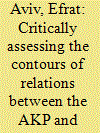

|
|
|
|
|
| Summary/Abstract |
In Turkey’s increasingly authoritarian context, which minimizes any serious chance of making political gains, challenging common conceptions of political power may expand our understanding of power dynamics. This article draws upon historical perspectives to track the power dynamics and political relations of religious movements inside and outside the legitimate forms of politics in Turkey. It provides insights into how political power is being reframed through religious movements and vice versa. It also examines the history of Turkey’s religious movements and their relationship with the government since 1925. It also discusses how the state-religion relationship has changed since the rise of the Justice and Development Party (Adaletve Kalkınma Partisi, AKP) and the 2016 coup attempt. It presents a case study of Furkan Vakfı and its leader, Alparslan Kuytul, who vehemently opposed the government and is now regarded as a threat by Erdoğan and the AKP.
|
|
|
|
|
|
|
|
|
|
|
|
|
|
|
|
|
|
|
|
|